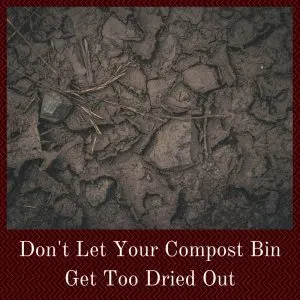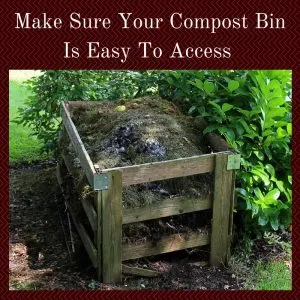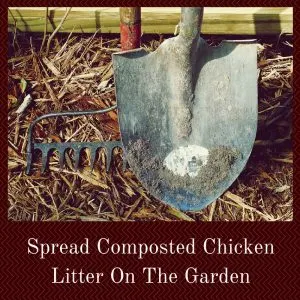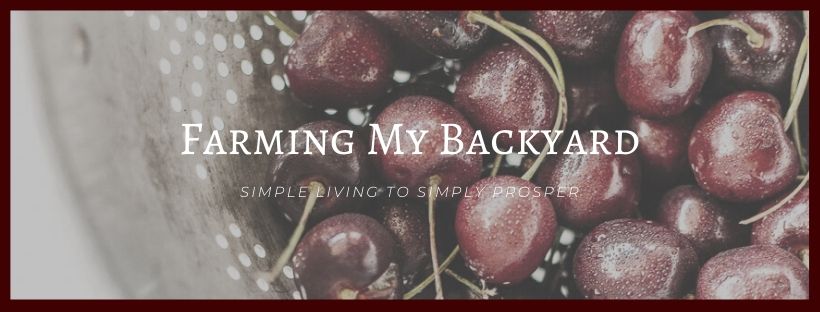I started my first compost bin in 2008 and I was so jazzed up and excited about it. I was going to turn my yard and kitchen waste into black gold! Grow awesome vegetables! Save the earth!
Yeah, that didn’t happen.

I never thought about how not to compost, I figured stuff just naturally breaks down all on it’s own.
My first compost piles were too small, to dry, and too full of woody sticks. I spent ages and ages turning them only to find that they hadn’t broken down at all.
I had my husband build a fancy-schmancy new compost bin that was going to solve all my compost problems.
Yeah, that didn’t happen either.
This compost bin was hard to turn, too soggy, and packed way too full.
It eventually did break down into compost, but it didn’t look (or smell) that great in the process, and it was a pain in the neck to get it out.
Plus, with chickens, goats, and rabbits, I NEEDED more compost bins, so I set up a jumbo size three bin pallet compost bin that would make awesome compost.
And yeah…didn’t happen.
THIS compost bin took too much time for me to keep up with. It was either too wet or too dry, to full or too small.
Because I was lazy and throwing ALL my kitchen scraps into it, including meat, milk, and oil it slowly became a bed and breakfast for the rodent population.
I did my best to get it cleaned up and stopped adding in kitchen waste.
Unfortunately, rats discovered that the neighbor’s dilapidated shed on the property line made a cozy house.
They also seemed to think the chicken feeder in our yard an excellent grocery.
It was gross.
It took quite some time and effort to get THAT little nasty homestead adventure under control.
Now, it wasn’t until we got new neighbors who actually took the time to clean up their side of the fence that I felt comfortable tackling the issue of the not-composting compost again.
(Hey! Did you know if you let your compost get too dry you’ll find rat babies in it? Yaaaaaay. Not.)
Maybe you are just starting composting, and want to avoid trouble, or maybe you tried and it just didn’t turn into the crumbly, earthy goodness we all imagine.
But don’t worry, here’s a list of the best ways to mess up your compost!
(Aaaaaaand…I’ve actually done all of these…)
Here’s how NOT to compost:

- Put the bin too far away
- Make the bin too small
- Put in large sticks and branches
- Toss oils, fats, meats, and milk on the top of the pile
- Let it get soaked with rain
- Let it bake in the sun
- Put in spilled dog food
- Have no way to get the compost out of the bin
- Put a lid on top that’s too heavy to move
- Never, ever, EVER turn it
- Keep adding more until it’s packed full
- Harvesting it before it’s done “cooking”
- Put in glossy paper
- Accidentally dump your spoons in with the kitchen waste (I have found SO many spoons when harvesting my pile it’s embarrassing)
- Chuck in the seedy weeds you kept meaning to pull
- Assume the blackberry plants are dead before you put them in (those demons can root ANYWHERE…unless I intentionally plant them).
I know there are compost gurus out there that can make it all work, but that isn’t me! Luckily, I’ve found some tricks that help keep the waste off the curb.
Related:
- Compost Makes Every Homestead Better. Want to Try?
- 15 Chicken Keeping Mistakes To Avoid
- Growing Plants From Kitchen Scraps is Surprisingly Easy!
- Building Soil Is The Big Secret To Great Gardens
- DIY Composting Toilet
How I Compost Now
Now I have a little bit of a different way of doing it than the traditional compost bin, but it’s been working, and the soil is happier (me too!).
I give all my kitchen scraps from the day before to the chickens in the morning.
If they don’t finish it, any fruit or veggie scraps go into the compost bin.

I rarely have leftover meats; the chickens usually polish those off.
If I do, they go into the city compost can or the trash can (unless I have a nice hot pile going, which does happen occasionally when the stars all align.
For more information on composting “forbidden” things check out the Humanure Handbook by Joseph Jenkins, or Holy Shit by Gene Logsdon, and then go build yourself a composting toilet).
I do deep litter for the chickens, and it breaks down in place until it’s time to spread it on the garden.
If the chicken and rabbit bedding is dry enough it just goes right into the no dig garden for a layer of mulch.

The rabbit litter boxes have a lot of urine that I don’t want to put right on the garden. Those go into the compost bin along with things that aren’t safe for the animals to eat, like onions, potato skins, and apple cores.
This is a much smaller bin that doesn’t take me long to aerate or check the moisture level. It’s also closer to the house, so I check on it more often.
These changes have really made a difference in actually making compost and improving my soil, instead of just mucking around in big bins of yard, animal, and kitchen waste.
Another trick I’ve found is to let the chickens do as much of the work as possible.
Do you compost? Is it smooth sailing or a disaster?
Want To Raise Happy Chickens?
Subscribe for our newsletter and get the free email course Intro To Backyard Chickens as well as a free printable checklist to walk you through step by step!

Laurie Townley
Thursday 7th of September 2023
I am new at composting all of my kitchen scraps. I don't understand how anyone can actually do this! I have seen cute kitchen compost canisters for sale, but that would never work for us! After only one week I feel like I will need a small dumpster in my kitchen! I garden and can and cook meals at home, so we have so much compost! There are peelings and corn husks and food scraps - It all takes up so much space. How long do you keep kitchen compost in the kitchen before it can be moved to an outside compost bin? (I don't want to move it too soon and get mice! yuk ) Thanks in advance for any advice.
Kathryn
Tuesday 12th of September 2023
Okay, so it won't compost in your kitchen. The little compost kitchen containers are just to collect scraps until it's convenient to run outside. I can't use those either. They don't hold nearly enough! I usually use a plastic ice cream bucket either in my sink or under it, and I take it out in the evening and toss it in the dishwasher. But if I'm producing a lot of compostables (like cutting a watermelon or husking corn) I'll take it out as part of that project.
Keeping your outside compost damp and well turned will discourage rodents, but if you're really worried about that you can try on of the black plastic premade compost bins or try in ground composting. I hope this helps! It is a little bit of a learning curve!
Kris
Wednesday 26th of October 2022
Thank you for the information given with humor and being concise. It made me chuckle. I haven't searched your site yet, but if you haven't already shared your story on getting rid of rats, please add it to your list of ideas to share. I think they are the culprit for eating my nectarines, grapes, and a few other garden goodies. My compost is in garbage cans to deter all critters. I am also working on trying to trim lower branches of bushes to eliminate places for them to congregate. Hoping to disrupt their highway use and access to my fuyu persimmon tree, I recently put carpet tack along the wooden fence railing. There was very little success in my attempt to cover grapes with those drawstring netting gift bags. They would tear/chew off the stem to drop it to the ground and chew a hole in the bag.
Kathryn
Wednesday 26th of October 2022
Whew, sounds like a real pain! I haven't had issues with them in my garden, but here are some things I've learned about keeping them away from chickens: https://farmingmybackyard.com/4-things-you-need-to-know-about-chickens-attracting-rats/
Doris
Thursday 4th of August 2022
I have never put meat or dairy on my compost. Just veggies, grass clippings etc. I also add soil in between layers and I do add compost starter. It has dried out on me a few times but we are in a cooler climate so no issues with rodents taking up residence. I have made some pretty good soil.
Donna
Monday 1st of November 2021
Yesterday, i was turning mine. Deep down, I found hundreds of roaches!!!!
Kathryn
Wednesday 3rd of November 2021
Yikes! Keeping it well aerated and turning it frequently can help that not happen again, as will keeping it really hot. And you can try putting diatamaceous earth around the perimeter of the bin too.
Sidney
Tuesday 15th of September 2020
I have a small container for my food scraps & it gets emptied daily. It goes into a tumbler bin, and I toss in some paper that has been dampened with water. I also toss in clippings from my organic vegetable garden when I prune my plants, after inspecting them for insects and plant diseases. Have you ever tried the compostable bags?
Kathryn
Wednesday 16th of September 2020
Nice! I have had the compostable bags break down in my backyard bin, but I don't usually buy them, just to save money. They are very nice if we need to use the city yard waste bin for composting though.